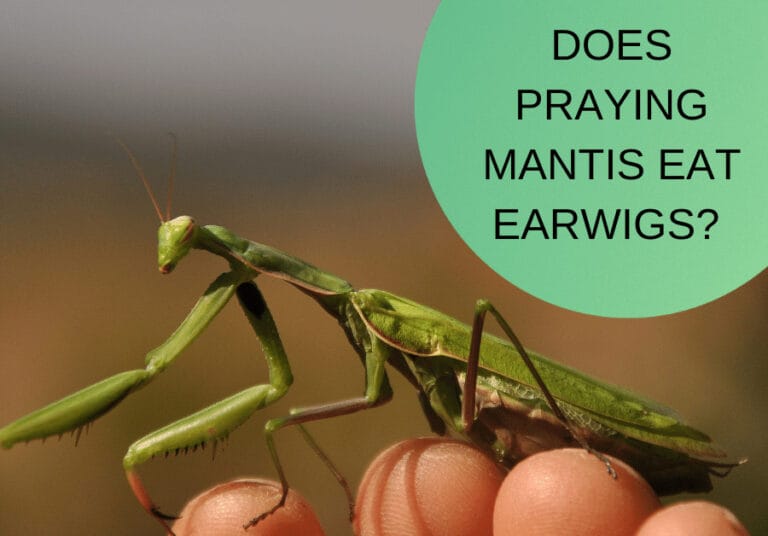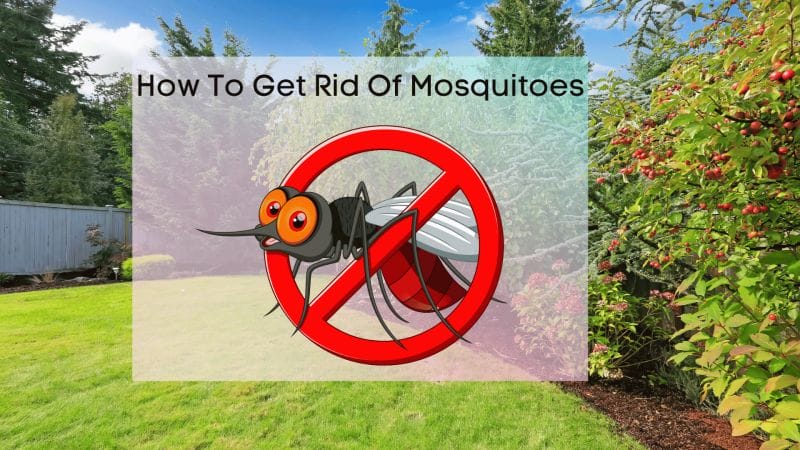
Summer will be here soon, and it will be time to start planning those outdoor gatherings. But with the warm weather and outdoor activity comes one pesky problem – mosquitoes. As much as we all love the outdoors, no one wants to be bothered by these bothersome bugs while trying to enjoy a summer party. So, controlling mosquitoes in your yard is imperative before hosting a party.
There are many ways to keep mosquitoes off your yard. Using natural and artificial repellents, installing bat houses, using zappers, etc., are some great ways. But there are loads more.
In this article, we’ll provide tips on how to get rid of mosquitoes in your yard for a party. We will examine the 7 best ways to eliminate mosquitoes from your yard. Also, knowing why mosquitos are bad news will be an extra motivation for killing these nuisances, so we'll look at that too. Let's get started!
Table of Contents
How To Get Rid Of Mosquitoes In The Yard For A Party? 7 Best Tips
There are many ways to remove mosquitos before throwing a party. Targeting where they live, along with some natural and artificial repellents, can be a deadly combo.
Not all of them are equally effective; they require different preparations and money. So we will discuss all the best possible options suitable for all. Here are 7 best tips to get rid of mosquitos in your yard for a party:
1. Remove Mosquito Breeding Spots
You can eliminate mosquitoes in your yard by removing their habitats. If you're looking for an effective way to eliminate mosquitoes in your outdoor space, the best thing to do is destroy their habitats.
Mosquitoes thrive in moist, cool, shady environments, so taking care of your property to reduce their presence is essential. Start by removing any stagnant water from your property.
Even the most minuscule amounts of water can be a breeding ground for mosquitoes, so it's essential to regularly clean out items such as bird baths, toys, clogged rain gutters, garbage can lids, and any other sources of standing water.
Besides that, you can also reduce the number of mosquitoes in your outdoor space by ensuring your property is well-maintained. Keep your lawn trimmed, eliminate debris, tall grass, and remove any areas of shade that may be attractive to mosquitoes.
2. Use Natural Mosquito Repellents
Using natural remedies ts is one of the most efficient ways to keep mosquitoes away from your yard and party area. Natural repellents are cheap and safe, and they work well.
Plus, they are readily available in our households most of the time. Here are three common natural mosquito repellents that you can use:
Spread Coffee Grounds
Coffee grounds are an excellent natural mosquito repellent. Sprinkle a thin layer around the area you want to protect, and the aroma of the grounds will keep the mosquitoes away.
You can also spray coffee grounds and water and apply them to the area. Coffee grounds can safely be added to any compost pile or garden, as the settings are a great source of plant nutrients.
Burn Pinion Wood in Backyard Fire
Another excellent natural mosquito repellent is pinion wood. Pinion wood is a type of juniper wood used for centuries by Native Americans for its pungent aroma.
Burning the wood in a backyard fire will produce a thick, sweet-smelling smoke that will repel mosquitoes. The smell of burning pinion wood is great and also repels mosquitoes, and it’s aroma will not be offensive to your guests.
Lemon Eucalyptus Oil
Lemon eucalyptus oil is essential; it can create an effective mosquito repellent. A mix of lemon eucalyptus, witch hazel, and water is an excellent mosquito repellent.
Spray this mixture around the areas you want to protect and reapply every few hours. Avoid contact with your skin, as this oil can be irritating.
3. Plant Mosquito-repellent Trees
Plant-based insect repellents can be a great addition to your lawn; they enhance the aesthetics of your yard and give it a natural look, all the while killing mosquitos like a pro.
Mosquitoes use the smell of carbon dioxide we exhale to detect us. So, these plants mask that smell and, on top of that, produce an odor that is offensive to them but pleasant to us.
Many plants can repel mosquitoes; we will discuss the most significant ones here. Let's have a look:
Citronella
Citronella is the most well-known mosquito repellent plant. It has a strong, citrusy smell that is known to repel mosquitoes.
Citronella candles (citronella oil) are well known for repelling household insects. You can plant them in your garden to defend against mosquitoes and crush their leaves for further protection against mosquitoes in secluded places.
Marigolds

Marigold flowers contain oil that acts as a natural bug repellent. They are easy to grow and are often used as border plants.
Marigolds add a cheerful, bright touch to your garden while preventing certain bugs. Their beautiful fragrance and look can be a great addition to your lawn.
Rosemary
Rosemary is a plant that thrives in hot and dry climates. Its peculiar smell makes it a crucial cooking ingredient. But that very same smell bothers mosquitoes.
You can have a potted rosemary plant on your lawn to defend against mosquitos. These plants are easy to grow and maintain, making them perfect for beginner gardeners. We typically grow rosemary yearly and keep the potted plant on the deck porch.
Lavender
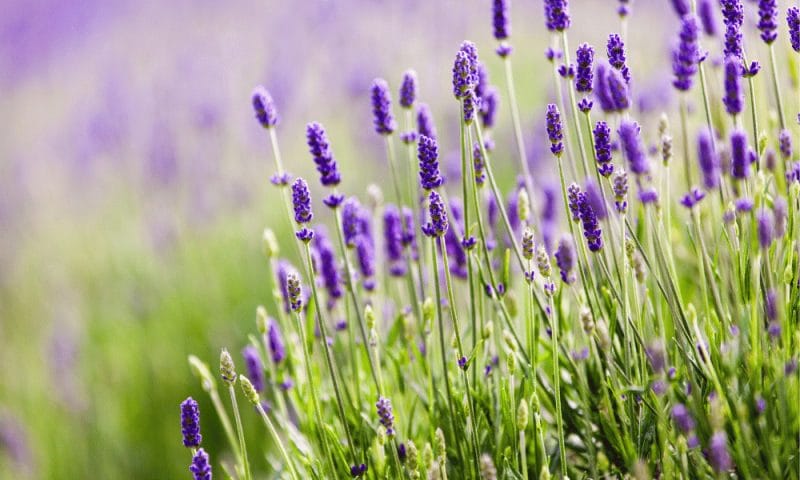
Adding a vibrant splash of purple to your garden, lavender is a prevalent choice for outdoor spaces. Not only is it visually pleasing, but its delightful scent repels insects and helps keep your garden free from pests.
Its essential oils are even more effective than DEET in warding off pesky mosquitoes, meaning you can enjoy your garden in peace. Moreover, its strong scent helps mask human odor and makes it harder for mosquitos to spot you.
So many other plants can repel mosquito attacks and give you a painless yard party away from those pesky creatures. Here are some of them:
- Basil
- Rose Geraniums
- Catnip
- Horsemint
- Lemon Balm
- Garlic
- Sage
4. Install Outdoor Fans
Say goodbye to mosquitoes and sweltering summer heat with the simple installation of a fan. Not only will these fans keep away those pesky insects, but they can also provide a refreshing breeze for your outdoor gatherings.
Place the fan at a location where the air blows outward, away from typical seating and speaking areas. You can install the fan on your deck or patio or hang it from the roof of a patio or porch cover or the top of a gazebo or awning.
The consistent, strong winds generated by the fan will make it difficult for mosquitoes and other small insects to fly against the flow. In addition, the fan will offer a cool reprieve from the summer heat. If you have a covered porch or a well-built gazebo with power, consider installing an outdoor-rated ceiling fan.
It’s simple—a fan is all you need to say goodbye to the sweltering summer heat and those pesky mosquitoes.
5. Light Up the Area
Outdoor lighting isn't just for aesthetics. It can also be a great way to keep mosquitoes and other pests away. With customized insect light bulbs, you can reduce the likelihood of mosquitoes being drawn to light while still providing the perfect ambiance for any occasion.
And if you need an extra layer of protection, place mosquito-repellent lamps in crucial areas around your dining tables, side tables, and buffets. With these solutions, you can create the perfect lighting and keep those pesky critters away.
6. Use a Bat House
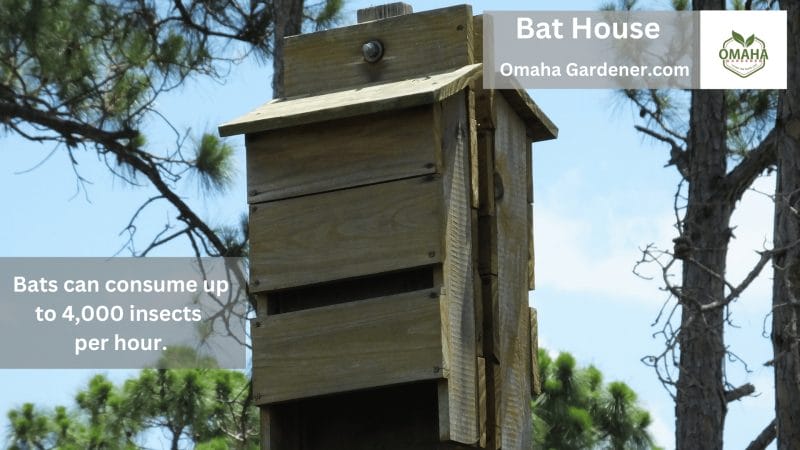
Introducing natural predators makes eliminating pesky insects like mosquitoes and other pests in your yard easy. Bats are an excellent example of a natural predator that can help keep your backyard bug-free.
Bats can consume up to 4,000 insects per hour. That's a lot of pesky critters to be taken care of! But don't worry; bats are generally not a threat to people and will likely stay away from your home if you provide them with their own house. To lure bats to your yard, install a bat house on a pole 15 to 20 feet above ground level and at least 20 to 30 feet away from any trees or structures.
Using natural predators like bats in your yard allows you to take advantage of their bug-catching abilities and enjoy a mosquito-free outdoor space.
7. Install Mosquito Zappers
Bug zappers have been around for a while, and they're here to stay — for a good reason! They work! If you've never seen one, an insect zapper works by zapping your pest with electricity.
These zappers use UV light bulbs to draw cockroaches, flies, moths, and other insects to them. When they land on the electrical grid within the zapper, it completes the circuit and kills the insect with a high-voltage shock.
Although there is controversy about whether bug zappers attract mosquitoes, many current models are built for many insects. Given their modest cost, it might be worth having a few around your deck and yard if you're having a bug problem.
What is a Mosquito Control Program?
The main objective of a mosquito control initiative is to decrease the number of mosquitoes and the potential spread of diseases they carry. Multiple municipalities have implemented plans in areas where mosquitoes are a concern, so be sure to consult with your local government. The program may include a variety of methods (we mentioned a couple of these earlier in the blog), like:
- Source reduction: Eliminating or reducing standing water sources where mosquitoes breed and lay their eggs.
- Larviciding: Applying insecticides to water sources where mosquito larvae are present to kill them before they develop into adults.
- Adulticiding: Spraying insecticides to kill adult mosquitoes in the area, usually done in the evening or early morning when mosquitoes are most active.
- Biological control: Introducing natural predators or parasites of mosquitoes, such as fish or bacteria, to reduce their population.
- Raise awareness and Educate: Provide information to communities regarding mosquito breeding sites, protecting themselves from mosquito bites, and the potential health risks associated with mosquitoes.
Mosquito Saga (ouch)
Why Is It Essential To Get Rid Of Mosquitoes Before An Outdoor Party
Regarding outdoor partying, getting rid of mosquitos is a priority. There are only two reasons for getting rid of mosquitoes; their bite hurts, and mosquitos kill the highest number of people yearly, around 1 million. Let's take a look in detail:
Mosquitos are Annoying
Mosquitos are one of the most annoying bugs that invade our homes and outdoor spaces. They buzz around and often bite us, leaving us with itchy, red bumps.
Mosquito bites can be unbearable for many people, causing them to scratch and tear their skin. Mosquitos can also cause discomfort and anxiety, making it difficult to enjoy the outdoors.
They Can Cause Serious Disease
In addition to being annoying, mosquitos can be dangerous and cause illness. They are known carriers of various diseases, including yellow fever, malaria, dengue fever, Zika virus, West Nile virus, and more.
These diseases can be deadly and spread quickly in areas with high mosquito populations. That’s why getting rid of these pests and protecting ourselves and our families is so important.
What is the mosquito lifecycle?
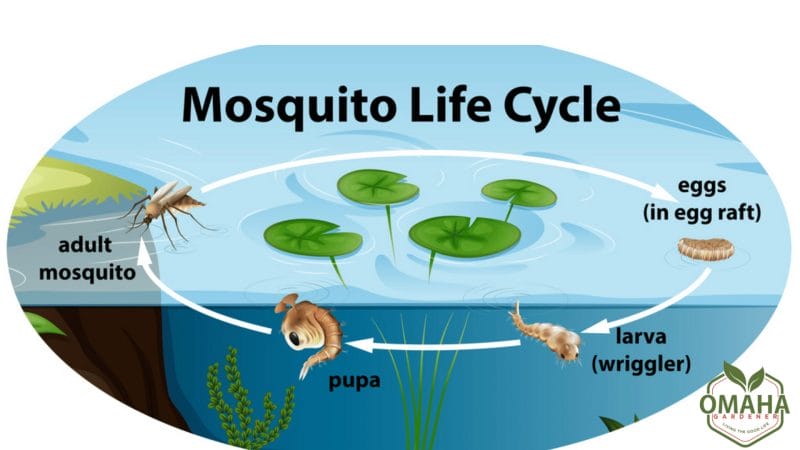
Mosquitoes undergo four stages: egg, larva, pupa, and adult. The life cycle starts with eggs being laid on standing water. The larvae feed on microorganisms and molt several times before becoming pupae. After a few days, the adult mosquito emerges, mates, and seeks a blood meal to develop eggs. The lifespan of adult mosquitoes varies, and females can lay multiple batches of eggs.
Frequently Asked Questions
What are mosquito dunks, and are they safe?
Mosquito dunks are a type of biological control that contains a bacteria called Bacillus thuringiensis israelensis (Bti), which kills mosquito larvae but is not harmful to humans, pets, or other wildlife. When the mosquito larvae consume the Bti bacteria, it releases toxins that destroy their digestive system, preventing them from developing into adults. Additionally, while Bti is not harmful to most wildlife, it can affect some species of non-target insects, such as midges and black flies.
Does mosquito dunk affect honey bees?
Typically, mosquito dunks containing Bacillus thuringiensis israelensis (Bti) are deemed safe for honey bees. Bti is a bacteria that specifically targets mosquito larvae and has little to no impact on non-target organisms, including honey bees. Want pollinators? Read my blog post: 7 Ways To Attract Amazing Pollinators To Your Garden.
When should you fog for mosquitoes before a party?
Generally, it is suggested to fog at least 24 hours before a party to give the fog ample time to settle and dry. This typically ensures that the area is free of mosquitoes during the party. However, it is best to consult a professional mosquito control service for advice on the frequency and timing of fogging based on your specific location and circumstances.
Conclusion
With the proper preparation, you can ensure your yard is a mosquito-free zone for your next party. Start with simple solutions such as eliminating standing water, a favorite breeding ground of mosquitoes. Add a fan or citronella candles to the area to help keep the bugs away.
Planting certain mosquito-repelling plants, like rosemary and marigold, can also be effective in keeping mosquitoes away. Lastly, consider using a mosquito control device to reduce the mosquito population in your yard further. Following these steps will ensure that your outdoor event is successful and enjoyable!



